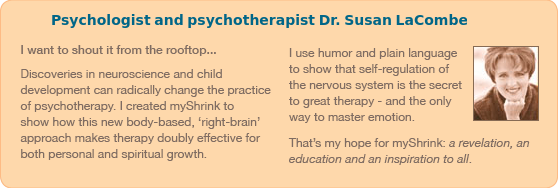Resistance in Counseling
If you've dropped in from elsewhere you'll spoil the exercise if you continue reading. First read the description of procedural memory here.
Let's try an experiment.
Take a moment and click the ad below the 'Don't Bother Reading" on the Getting Around page enticing you to have a mini counseling experience. It's called 'Can't Sit Still?'. Watch the 20 second video, then return here.
I'll be waiting for you...
Did you watch it? No? Notice how you really don't want to. Going to another page to watch the video takes you 'out of procedure'. It pulls you away from the compelling feeling of wanting to continue reading. (and I can imagine some of you thought I was just trying to get you to buy my DVD!)
Now take a moment to notice how it feels in your body. Maybe you feel impatient (very common when we change a procedure) or maybe you have a feeling of urgency (i.e. "I don't have time Dr. LaCombe, let's get to your main point").
This is the resistance that appears when you try to change a procedure. It is this resistance that needs to be overcome in counseling in order to change a habit or to shift gears and adopt a new patterned response.
For those who watched the video...
Congratulations! You have now interrupted the procedure.
A new way of looking at...Procedural Memory
Try to remember this feeling. It is the feeling you'll meet, and must overcome, when you make changes to habitual patterns and behaviours.
And, what you did is more significant than it first appears.
You have gone from a state of arousal, from reading fairly dense text (and trying to figure out what the heck I'm talking about) to the more relaxed state of watching a 20 second video.
Perhaps your arousal level (i.e. your activation) only came down a notch. That's okay, a notch is a good beginning. How much it came down depends on the health of your nervous system, because a healthy well-regulated nervous system is easier to calm down.
Perhaps this moment helped to discharge excess energy and calm you down even more.
In either case you have taken your nervous system 'out of procedure' and felt it become more relaxed.
You can imagine also if a procedure has a lot of energy or momentum associated with it, how difficult this might be. And, this is where counseling comes in. In the presence of an empathic, attuned therapist, your task will be that much easier!
Can you imagine the implications?
How procedural memory relates to counseling.
Some therapies--body psychotherapy especially--get results by interrupting old patterns.
Imagine that I am telling my counselor about the time my arm was broken in a car accident. Even thinking about it usually gets me agitated. But instead of letting me describe the whole incident from beginning to end, she interrupts and tells me to pause as I relate the details of my story.
Then she guides me through a short grounding exercise so I feel calmer. She does this several times as I relate what happened. By the end of the story I'm not feeling quite so shaken up as I am usually.
My counselor is 'interrupting the procedure'. She is training my nervous system to manage the arousal of this stressful event in a more efficient way, in bite-sized pieces rather than all at once.
As we do this repeatedly over the course of counseling, my nervous system learns to manage energy for other difficult subjects--even ones we haven't discussed. The process of interrupting the procedure trains my nervous system to manage all activation energy more efficiently. In effect, I learn to incorporate self-regulating and self-soothing procedures, but at an unconscious level.
Procedural Memory and Relating to Others
Procedural memory is a type of implicit memory. Implicit memory as you may recall encodes our patterns for relating to ourselves and others.
Two features of procedural memory are relevant for your counseling: it takes many repetitions of a behaviour or an emotional response before it's ingrained, and once that procedure is established it's difficult to change.
For the same reason, we can't change our way of relating (i.e. implicit memory) simply by telling ourselves to feel differently. It requires special conditions for the change to occur.
N.B. Those special conditions are the subject of a future eCourse. Watch for details in MyShrink UpDates the MyShrink eNewsletter.
P.S. Procedural Memory and Anxiety
What's really important for anxiety sufferers to know is that the higher your activation (anxiety by definition means you have high activation) the more you are "in procedure". And, the more you are in "procedure", the more you will engage in non-conscious behaviours.
This is why chronic anxiety has such a huge negative impact on your ability to concentrate, to feel emotions and to sense your spiritual nature. In other words, you will be less present to make good choices and smart decisions in your life.
Reviewed by: Andrew Larcombe RPN, MA.
Reference and further reading:
Grigsby, Jim & Stevens, David (2000). Neurodynamics of Personality. New York: Guilford Press.
Are you taking the Science of Counseling Tour ?
Click on the next link in the series called 'Joy' :
Introduction
What's with the Reptile?
The Right Brain
Activation
Implicit Memory
Procedural Memory
Joy

